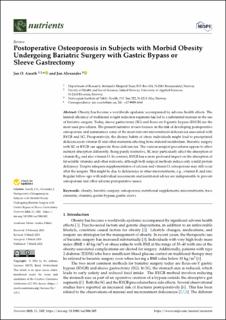Postoperative Osteoporosis in Subjects with Morbid Obesity Undergoing Bariatric Surgery with Gastric Bypass or Sleeve Gastrectomy
Peer reviewed, Journal article
Published version
Permanent lenke
https://hdl.handle.net/11250/3106549Utgivelsesdato
2023Metadata
Vis full innførselSamlinger
Sammendrag
Obesity has become a worldwide epidemic accompanied by adverse health effects. The limited efficiency of traditional weight reduction regimens has led to a substantial increase in the use of bariatric surgery. Today, sleeve gastrectomy (SG) and Roux-en-Y-gastric bypass (RYGB) are the most used procedures. The present narrative review focuses on the risk of developing postoperative osteoporosis and summarizes some of the most relevant micronutrient deficiencies associated with RYGB and SG. Preoperatively, the dietary habits of obese individuals might lead to precipitated deficiencies in vitamin D and other nutrients affecting bone mineral metabolism. Bariatric surgery with SG or RYGB can aggravate these deficiencies. The various surgical procedures appear to affect nutrient absorption differently. Being purely restrictive, SG may particularly affect the absorption of vitamin B12 and also vitamin D. In contrast, RYGB has a more profound impact on the absorption of fat-soluble vitamins and other nutrients, although both surgical methods induce only a mild protein deficiency. Despite adequate supplementation of calcium and vitamin D, osteoporosis may still occur after the surgery. This might be due to deficiencies in other micronutrients, e.g., vitamin K and zinc. Regular follow-ups with individual assessments and nutritional advice are indispensable to prevent osteoporosis and other adverse postoperative issues.

